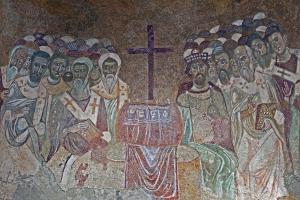
We find the incarnation is at the heart of the Christian faith. We are taught that God, the creator of all things, took on human nature and became one of us. God did this, not only to save us, but to deify us. We are called to be partakers of the divine nature.
The incarnation is a great mystery. When we reflect upon it, all kinds of paradoxes develop, not because the incarnation is false, but because it transcends what we are able to comprehend with human reasoning. The incarnation also connects us to the other special revelation of the Christian faith, the revelation of God as Trinity. Like the incarnation, the Trinity presents to us paradoxes which transcend human reasoning. Both the teaching on the incarnation and the teaching of the Trinity provide us propositions to believe, propositions which, in some way, we understand what is being said by them, and yet propositions which, when reflected upon, lead to various antiomial paradoxes which demonstrate how limited we are in comprehending the great mysteries of the faith. When we try to overcome the paradoxes of faith, we end up undermining various aspects of the truth, and when we do that, whatever conclusions we arrive at end up being erroneous because they fail to take into accord the whole truth.
This does not mean that we that the faith should be lived out through some sort of unintellectual fideism, believing the words used in our propositions without trying to grasp what they mean. We are called to worship God with all our mind, body, and soul; we are meant to have an intellectual engagement with whatever truth God reveals to us. We should try to discern all the details which have been revealed and examine the paradoxes from every angle possible. We are to do this, not only in our personal capacity, but also as a community of faith. We are to come together to experience Christ in our lives, to experience Christ uniting us together. When we do this, we find ways to express the truth of revelation which allow us, in our limited capacity to understand it, to have a way to discuss it with each other and with others who come to us and are interested in our experience with God.
The history of the first six ecumenical councils is the history of the community of faith coming together to find the best way to represent the revelation it has been given. And, as anyone who studies the history knows, it was a difficult process. There was much bitterness and strife involved, with Christians, including saints, often acting out their worst instincts. And yet, despite it all, the Holy Spirit was able to guide the church and make sure it did not abandon the core reality of the revelation handed down to it. Christians had to come together to work it out. This is what God wanted. This is what Paul indicated Christians should do – to come together, to reason out and explore their faith in common, so as to come to have the same mind and judgment concerning the revelation given to them: “I appeal to you, brethren, by the name of our Lord Jesus Christ, that all of you agree and that there be no dissensions among you, but that you be united in the same mind and the same judgment” (1 Cor. 10:10 RSV). Paul said this because even in his own time, Christians were already fighting against each other; dissensions and ill-will created various divisions in the ecclesial community, with different groups of people unable or unwilling to appreciate and lift each other up. They needed to be reminded, even as we need to be reminded today, that the focus is on Jesus and what has been revealed to us through him.
To follow what Paul told us to do, we must transcend any sectarian approach to the faith; we must look to and appreciate different groups of people, the ways in which they think out and understood the faith, and find a way to bring all such reflections together as one. We must find a way to learn from those who have handed down the faith through the generations and proclaim the same faith which they held, showing how we are all united in our faith: “Remember your leaders, those who spoke to you the word of God; consider the outcome of their life, and imitate their faith. Jesus Christ is the same yesterday and today and for ever” (Heb. 7:7-8 RSV). What we proclaim must represent the same truth about Jesus that others proclaimed in their day and age. On the other hand, we must remember we do so in a new context. The questions which we ask, the concerns which we have, will be different from the questions and concerns people had in the past. This means, we have work to do, which is the same work every generation of Christians have had to do. We must make sure our answers conforms to the truth of revelation, that we do not undermine the paradoxes of faith through innovation, creating heresies which undermine revelation. Looking to the past, learning from and understanding the presentation of the faith as it has come to us from the past, from the leaders who upheld the faith in their own generations, will make sure we do this, even as we know others will be able to do so in the future thanks, in part, to our own contributions.
Those, then, who helped promote the faith, especially those who worked in and through the first six ecumenical councils, show us the way in which the faith both develops, in accordance to the way we speak of it, and yet always remains the same. The vocabulary, the sophistication of the later councils answered questions which the earlier councils did not even ask, but they did so in a way which affirmed the meaning intended by earlier councils. We, too, must affirm the basics of the faith presented in the councils, but we can and should do it in ways which not only affirm what they said but also the practice which they engaged in order to make their declarations. That is, we must have a willingness to take on the faith and present it as a living tradition instead of dead words, a tradition which allows for many ways of presenting and pointing to the core of the faith without exhausting that core itself. This, then, will help us make sure the faith is a true living encounter with God through Christ, and not just a set series of proposition which we hold onto in our thoughts but do nothing for us in reality.
Stay in touch! Like A Little Bit of Nothing on Facebook.
If you liked what you read, please consider sharing it with your friends and family!












